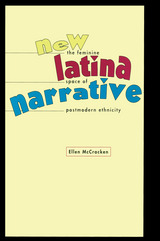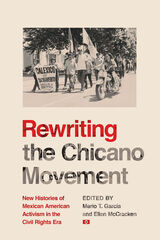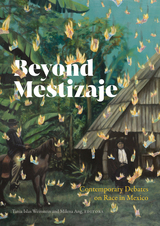2 books by McCracken, Ellen

New Latina Narrative
The Feminine Space of Postmodern Ethnicity
Ellen McCracken
University of Arizona Press, 1999
During the last two decades of the twentieth century, U.S. Latina writers have made a profound impact on American letters with fiction in both mainstream and regional venues. Following on the heels of this vibrant and growing body of work, New Latina Narrative offers the first in-depth synthesis and literary analysis of this transethnic genre. Focusing on the dynamic writing published in the 1980s and 1990s by Mexican American, Puerto Rican, Cuban American, and Domincan American women, New Latina Narrative illustrates how these writers have redefined the concepts of multiculturalism and diversity in American society. As participants in both mainstream and grassroots forms of multiculturalism, these new Latina narrativists have created a feminine space within postmodern ethnicity, disrupting the idealistic veneer of diversity with which publishers often market this fiction. In this groundbreaking study, author Ellen McCracken opens the conventional boundaries of Latino/a literary criticism, incorporating elements of cultural studies theory and contemporary feminism. Emphasizing the diversity within new Latina narrative, McCracken discusses the works of more than two dozen writers, including Julia Alvarez, Denise Chávez, Sandra Cisneros, Cristina Garcia, Graciela Limón, Demetria Martínez, Pat Mora, Cherríe Moraga, Mary Helen Ponce, and Helena María Viramontes. She stresses such themes as the resignification of master narrative, the autobiographical self and collective identity, popular religiosity, subculture and transgression, and narrative harmony and dissonance. New Latina Narrative provides readers an enriched basis for reconceiving the overall Latino/a literary field and its relation to other contemporary literary and cultural trends. McCracken's original approach extends the Latina literary canon—both the works to be studied and the issues to be examined—resulting in a valuable work for all readers of women's studies, contemporary American literature, ethnic studies, communications, and sociology.
[more]

Rewriting the Chicano Movement
New Histories of Mexican American Activism in the Civil Rights Era
Mario T. García
University of Arizona Press, 2021
The Chicano Movement, el movimiento, is known as the largest and most expansive civil rights and empowerment movement by Mexican Americans up to that time. It made Chicanos into major American political actors and laid the foundation for today’s Latino political power. Rewriting the Chicano Movement is a collection of powerful new essays on the Chicano Movement that expand and revise our understanding of the movement. These essays capture the commitment, courage, and perseverance of movement activists, both men and women, and their struggles to achieve the promises of American democracy.
The essays in this volume broaden traditional views of the Chicano Movement that are too narrow and monolithic. Instead, the contributors to this book highlight the role of women in the movement, the regional and ideological diversification of the movement, and the various cultural fronts in which the movement was active. Rewriting the Chicano Movement stresses that there was no single Chicano Movement but instead a composite of movements committed to the same goal of Chicano self-determination. Scholars, students, and community activists interested in the history of the Chicano Movement can best start by reading this book.
Contributors: Holly Barnet-Sanchez, Tim Drescher, Jesús Jesse Esparza, Patrick Fontes, Mario T. García, Tiffany Jasmín González, Ellen McCracken, Juan Pablo Mercado, Andrea Muñoz, Michael Anthony Turcios, Omar Valerio-Jiménez
The essays in this volume broaden traditional views of the Chicano Movement that are too narrow and monolithic. Instead, the contributors to this book highlight the role of women in the movement, the regional and ideological diversification of the movement, and the various cultural fronts in which the movement was active. Rewriting the Chicano Movement stresses that there was no single Chicano Movement but instead a composite of movements committed to the same goal of Chicano self-determination. Scholars, students, and community activists interested in the history of the Chicano Movement can best start by reading this book.
Contributors: Holly Barnet-Sanchez, Tim Drescher, Jesús Jesse Esparza, Patrick Fontes, Mario T. García, Tiffany Jasmín González, Ellen McCracken, Juan Pablo Mercado, Andrea Muñoz, Michael Anthony Turcios, Omar Valerio-Jiménez
[more]
READERS
Browse our collection.
PUBLISHERS
See BiblioVault's publisher services.
STUDENT SERVICES
Files for college accessibility offices.
UChicago Accessibility Resources
home | accessibility | search | about | contact us
BiblioVault ® 2001 - 2024
The University of Chicago Press









